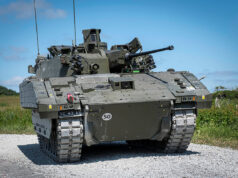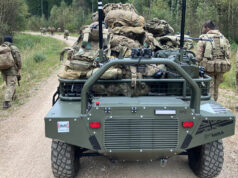The UK Armed Forces have seen a welcome boost in recruitment, but overall force numbers have declined, highlighting ongoing challenges in maintaining personnel strength across all services.
According to the Quarterly Service Personnel Statistics, released on 29 May 2025, the total strength of UK Forces was 181,890 as of 1 April 2025.
This represents a decrease of 1,340 personnel (1%) compared to the same point the previous year.
The decline was more pronounced among trained personnel. The Full-Time Trained Strength (which includes the Royal Navy, Royal Marines, Royal Air Force, and trade-trained Army personnel) fell to 126,610, down 3,160 (2%) from April 2024.
Despite these drops, the report revealed a significant increase in recruitment. Between 1 April 2024 and 31 March 2025, 13,450 individuals joined the UK Regular Armed Forces, an increase of 2,150 recruits (19%) on the previous year. In contrast, 14,590 personnel left, which is 1,140 fewer (7%) than the number who left in the preceding 12-month period.
The Future Reserves 2020 (FR20) also experienced a reduction in trained strength, now sitting at 29,200, a drop of 370 (1%). Intake to the reserves was 3,720, down 210 (5%), while outflow was 4,230, a sharp decrease of 1,040 (20%).
These figures reflect a complex personnel landscape for the Armed Forces. On one hand, recruitment has improved significantly, and fewer personnel are leaving. On the other, the ongoing reduction in trained strength suggests the Armed Forces are still facing difficulties in retaining experienced service members and meeting long-term personnel goals.
How are the Government trying to retain and recruit troops?
The Ministry of Defence has outlined a series of initiatives aimed at addressing the long-standing challenges of recruitment and retention within the Armed Forces.
Responding to a written question from Andrew Rosindell MP (Conservative – Romford) on May 8, 2025, Armed Fores Minister Luke Pollard detailed the steps being taken to reverse the decline in personnel numbers.
Pollard stated that the current government inherited a recruitment and retention crisis from the previous administration. In response, a comprehensive package of measures has been introduced since July 2024, focusing on both attracting new recruits and retaining experienced personnel.
To increase recruitment, the Ministry of Defence has introduced several key policies, including:
- A 35% pay increase for new recruits, marking one of the largest pay rises for Armed Forces personnel in the last two decades.
- The removal of over 100 outdated medical policies that previously hindered recruitment efforts.
- The implementation of a direct-entry cyber pathway to attract talent into military cyber roles.
- An ambitious target to issue a conditional employment offer within 10 days of application, with a provisional training start date within 30 days.
Pollard explained that these measures are part of a broader effort to streamline recruitment and reduce administrative bottlenecks. The initiatives are also expected to inform the development of the new Armed Forces Recruitment Service, aimed at making the recruitment process faster and more efficient.
Retention measures to support existing personnel
Retention of trained and skilled personnel is also a significant focus. The Ministry of Defence has introduced:
- A £30,000 financial incentive for a select group of tri-Service Air Engineers to encourage continued service.
- An £8,000 retention payment for a cohort of Army personnel to help retain essential skills within the force.
- Preservation of the Continuity of Education Allowance to support the families of service members.
- Repurchasing the Service Family Accommodation estate from Annington Homes to improve housing security.
- Extending Wraparound Childcare to families serving overseas, potentially saving up to £3,400 annually for service families.
Pollard added that these initiatives demonstrate the government’s commitment to investing in the well-being and professional satisfaction of Armed Forces personnel, ensuring the UK’s military remains both robust and resilient.














The 30K incentive is the bare minimum that was needed to keep the trade viable as they were paying below market rate and it’s not the only trade that will need a massive cash incentive over the next few years unless the Government decide to be grown up and admit we can’t do everything and bin off even more capability.
Preservation of the CEA? Are service personnel who board their children supposed to be grateful and appreciative that an important allowance has not been scrapped. Incredible.
Still, it’s much-needed progress from the previous regime of years of below-inflation pay rises, crap maintenance of barracks and family housing, threatened withdrawl of boarding school fees for service personnel serving overseas, etc. And especially overhauling the hopeless minefield of the Capita recruitment process for the army. Will be interested to hear more about this new Armed Forces Recruitment organisation
All these steps are lomg-overdue, so some credit to HMG and MOD surely?